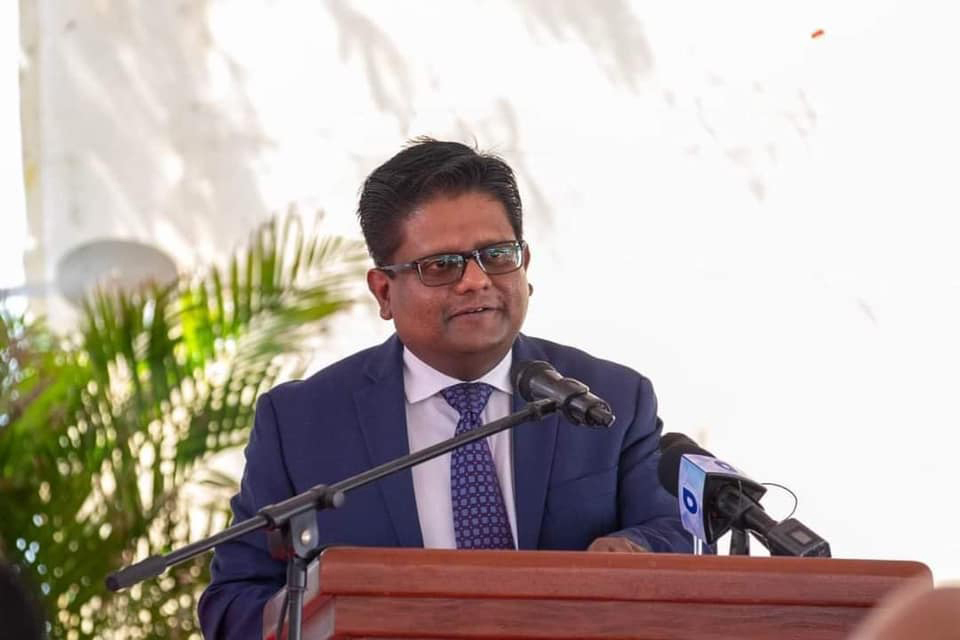The $1.146 trillion Budget piloted by Senior Minister in the Office of the President with Responsibility for Finance and the Public Service, Dr. Ashni Singh was last night passed in the National Assembly along with a bill to drastically increase extractions from the Natural Resource Fund (NRF).
The Appropriation Bill 2024-Bill No. 1 of 2024 was passed at the conclusion of the Sitting following five days of debate and four days of Committee of Supply Meetings, a release from the Ministry of Finance said.
The release said that with the aim of accelerating the delivery of public goods and services to Guyanese, while optimising the financing mix, Singh, on behalf of Government, also successfully piloted the Fiscal Enactments Amendment Bill No. 2 of 2024 in the National Assembly. This was also passed in the House.
During his presentation to Parliament on this Bill the release said that Singh emphasized “We have committed to delivering improvement to the well-being of all Guyanese in a rapidly accelerated fashion and at a rapidly accelerated pace and as was ventilated during the course of this debate, whether it is the rapid build out of physical and economic infrastructure, such as our transport and energy infrastructure, our social infrastructure such as public health care facilities and our educational facilities, or the strengthening of the capability of our security sector agencies, including the police and the fire service with the deployment of additional assets and the deployment of high technology, or the improvement of our social services, or the build out of our housing and water infrastructure, or indeed any other sector, we this PPP/C are in a hurry to improve the lives of every single Guyanese family and every single Guyanese individual.”
Critics have argued that increased extractions will deprive future generations of monies accruing from oil and gas.
The revised rule will take effect from this fiscal year and will replace the rule that currently exists in the act.
Prior to speaking further on the Bill, in reference to the walkout of the Main Opposition party members just before the Bill could be debated, Singh told the National Assembly that the APNU+AFC’s walkout was reminiscent of their actions in December 2021 when they disrupted Parliament during consideration of the Natural Resource Fund Act as they invaded the Well, seized and caused damage to the Speaker’s Mace as well as attacked staff of the National Assembly.
Singh said that it then should come as no surprise that the APNU+AFC chose to leave the House in the manner that they did since they ‘have a long and documented track record of frustrating and derailing progress’.
The Bill proposes that the First Schedule of the NRF Act 2021 be amended to reflect altered calculations for the ceiling on annual withdrawals. Under the revised proposals, a sliding scale is proposed for withdrawals from the first US$5 billion of deposits paid into the Fund in the immediately preceding fiscal year.
The Fiscal Enactments (Amendment) Bill approv-ed last night also includes provisions for the Removal of Duty and Value Added Tax (VAT) on Sports Equipment and Techno-logy, the Removal of Duty and VAT on Firefighting Equipment, Reducing the Cost of Life and Medical Insurance and an increase in the Income Tax Threshold.
The Income tax threshold, which was last increased to $85,000 in 2023 prior to being increased from $65,000 to $75,000 monthly in 2022, will now be upped to $100,000 monthly resulting in 13,000 persons being removed from paying income tax and a $4.8 Billion increase in disposable income of workers.
The Fiscal Enactments Bill also includes proposals to lift ceilings on domestic and external debt. The updated debt ceilings will take immediate effect and will provide government with the flexibility needed to adapt the financing mix depending on the evolving global and domestic economic situation, particularly given global uncertainties regarding interest rates.
The Bill proposes that the domestic public debt ceiling be increased to $1.5 trillion, up from $750 billion from its last revision. Meanwhile, a new external borrowing ceiling of $1.5 trillion was proposed, after its last increase to $900 billion.






